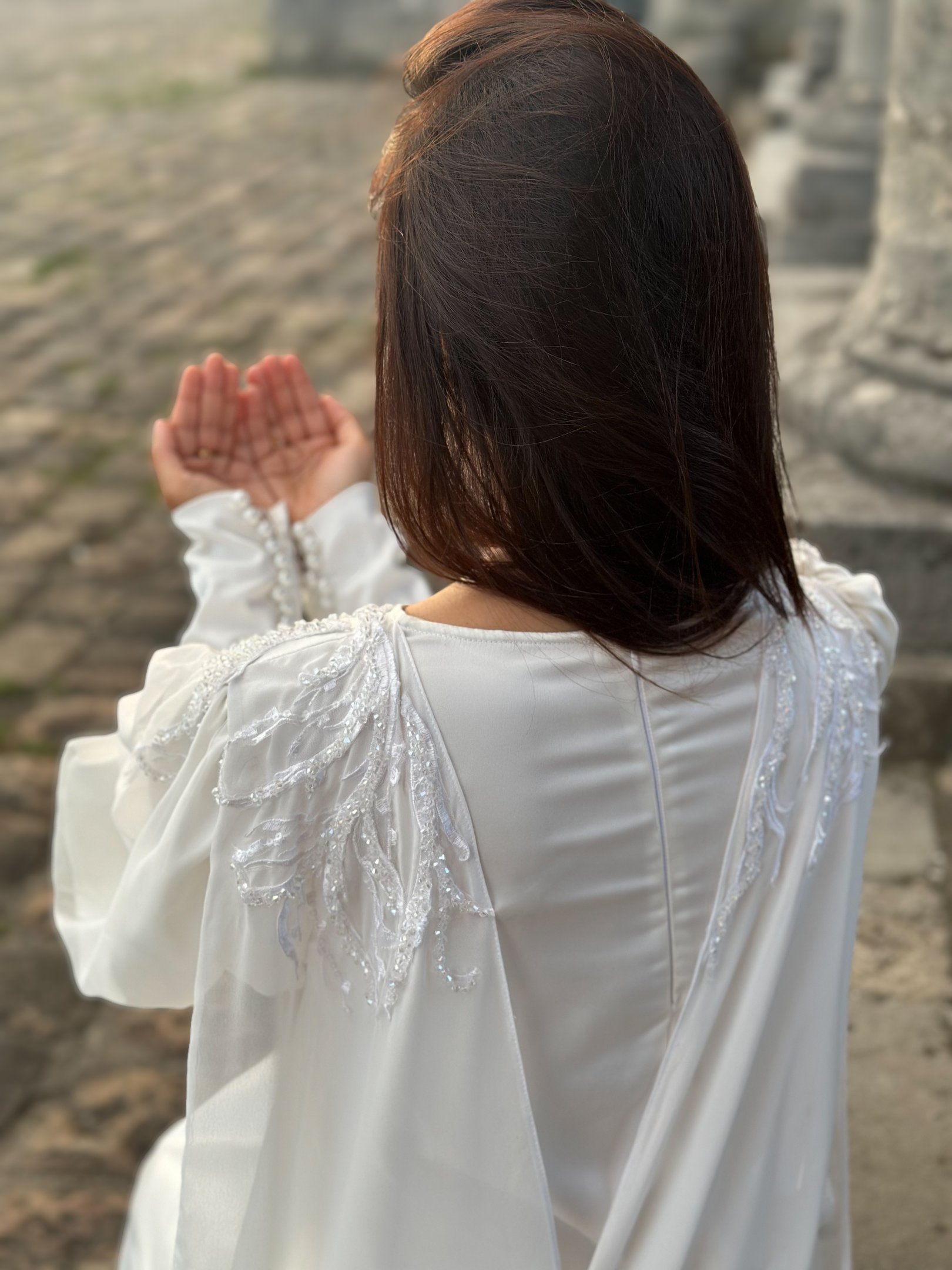Islamic Marriage Supplication
Description de l'article de blog :
Marriage occupies a central place in the lives of Muslims, representing a sacred union blessed by Allah. Preparing for marriage involves not only practical aspects but also religious ones, of which invocations (dou3as) play an essential part.


Invocations to recite when a Muslim seeks marriage:
When a Muslim seeks marriage, it is essential to turn to Allah for guidance and blessings. Dua plays a crucial role in this process, as it allows us to ask Allah to grant us a righteous spouse and bless this union. Dua are not only prayers, but also reflect our complete dependence on Allah and our trust in His wisdom and mercy.
Invocation of Musa عليه السلام: Surah 28-The story (Al-Qasas) Verse-24
Doua en Arabe:
رَبِّ إِنِّي لِمَا أَنزَلْتَ إِلَيَّ مِنْ خَيْرٍ فَقِيرٌ
Transcription: Rabbi inni lima anzalta ilayya min khayrin faqir
Translation: "Lord, I have great need of every grace with which You will bestow me!"
The prayer of consultation:
The Salat istikhara in Islam is a Sunnah (often written: Sunnah, Sounnah or Sunnah), and the invocation during this prayer is done after the final greeting, in accordance with what is reported in a noble prophetic hadith.
It is composed of two rakaas, the 13 pillars, like the tachahoud, and 7 conditions that we will do outside of the obligatory prayers. After performing ablution, begin the prayer, we must read in each rakaa the Fatiha and some verses of the Quran. Once the two rakaas are completed and after the final greeting, we can raise our hands towards the Qibla, and we will recite with sincerity, the following invocation:Doua in Arabic:
« اللّهُـمَّ إِنِّـي أَسْتَخيـرُكَ بِعِاْـمِك، وَأسْتَقْـدِرُكَ بِقُـدْرَتِـك، وَأَسْـألُـكَ مِنْ فَضْـلِكَ العَظـيم، فَإِنَّـكَ تَقْـدِرُ وَلا أَقْـدِر، وَتَـعْلَـمُ وَلا أَعْلَـم، وَأَنْـتَ عَلاّمُ الغُـيوب، اللّهُـمَّ إِنْ كُنْـتَ تَعْـلَمُ أَنَّ هـذا الأمْـرَ- وَيُسَـمِّي حاجَتَـه – خَـيْرٌ لي في دينـي وَمَعـاشي وَعاقِـبَةِ أَمْـري، فَاقْـدُرْهُ لي وَيَسِّـرْهُ لي ثـمَّ بارِكْ لي فيـه، وَإِنْ كُنْـتَ تَعْـلَمُ أَنَّ هـذا الأمْـرَ شَـرٌ لي في دينـي وَمَعـاشي وَعاقِـبَةِ أَمْـري، فَاصْرِفَهُ عَنِّي وَاصْرِفْنِي عَنْهُ وَاقْـدُرْ لي الخَـيْرَ حَيْـثُ كانَ ثُـمَّ أَرْضِـني بِـه »
Transcription :
Allâhumma innî astakhîruka bi-cilmika wa astaqdiruka bi-qudratika, wa as-aluka min fadlika-l-cazîmi
Fa-innaka taqdiru wa lâ aqdiru, wa taclamu wa lâ aclamu, wa anta callâmu-l-ghuyûbi
Allâhumma in kunta taclamu anna hâdhâ-l-amra (que l’on explicite) khayrun lî fî dînî wa macâshî, wa câqibati amrî fa-qdurhu lî, wa yassirhu lî, thumma bârik lî fîhi.
Wa in kunta taclamu anna hâdhâ-l-amra sharrun lî fî dînî wa macâshî, wa câqibati amrî fa-srifhu cannî, wa srifnî canhu
Wa qdur lî-l-khayra haythu kâna thumma arddinî bihi
And the Prayer of Consultation in French is therefore translated as follows:
“O Lord! I consult You from Your knowledge and I implore You to grant me the power of Your power and I ask You from Your immense generosity. For You are indeed able and I am unable, You know everything while I do not know, and You are the Great Knower of all that is unknown. O Lord! If You know that this thing – clearly name the thing in question – is a source of good for me in my religion, in my present life and in my Hereafter (or he says: this world and the Hereafter), predestined it for me and made it easy for me and blessed me with it. And if You know that this thing is for me a source of evil in my religion, in my present life and in my Hereafter (or he says: this world and the Hereafter), turn it away from me and turn me away from it and predestinate for me the good wherever it is, then make me satisfied with this decision.”
In this supplication, the righteous servant asks Allah to remove this matter if it is harmful to him and to make it easier for him if it is beneficial to him. We will name the action we want to undertake and ask Allah subhanahu wa ta'ala to guide us. We will ask Him to remove us from this matter if it is harmful to us and to make it easier for us if it is beneficial to us.



